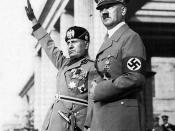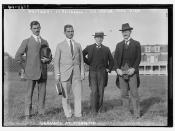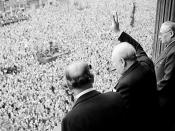World War I did not mark a break between two eras because the historical reality is that in Europe, the period from the 1880 until 1945 could be considered one single era. While World War I definitely could be a delineating point in the era, the social and political forces that were at work before the war continue on after the armistice, and were in fact greatly responsible for World War II.
In the late 1880s Europe was being transformed from a predominately agrarian society to an industrial society. As with any societal change, there is disruption in the way that people think and act and their belief system, that which was ingrained in them in the old societal structure, is forced to either change or be at constant odds with the new ways. For the new generation, just formulating their own beliefs, what they had been taught and what their parents had explained to them no longer applies and there is no template against which they can affirm their beliefs.
When the structure of a society radically changes, it is the intellectuals who attempt to make sense of what is happening and explain it to the masses in a way that they hope will encourage the masses to follow along in their beliefs. Political ideals such as liberalism, socialism and nationalism are prime areas of debate among the leaders. As the rich are usually the beneficiaries of societal changes and the poor are too concern in mere survival to engage in political debates, it is usually in the growing middle-class that the forces of change are mostly debated and fought over.
It is the middle-class that provides societies with their dominant values and during political change and upheaval it is commonly these values that the middle-class becomes dissatisfied...


